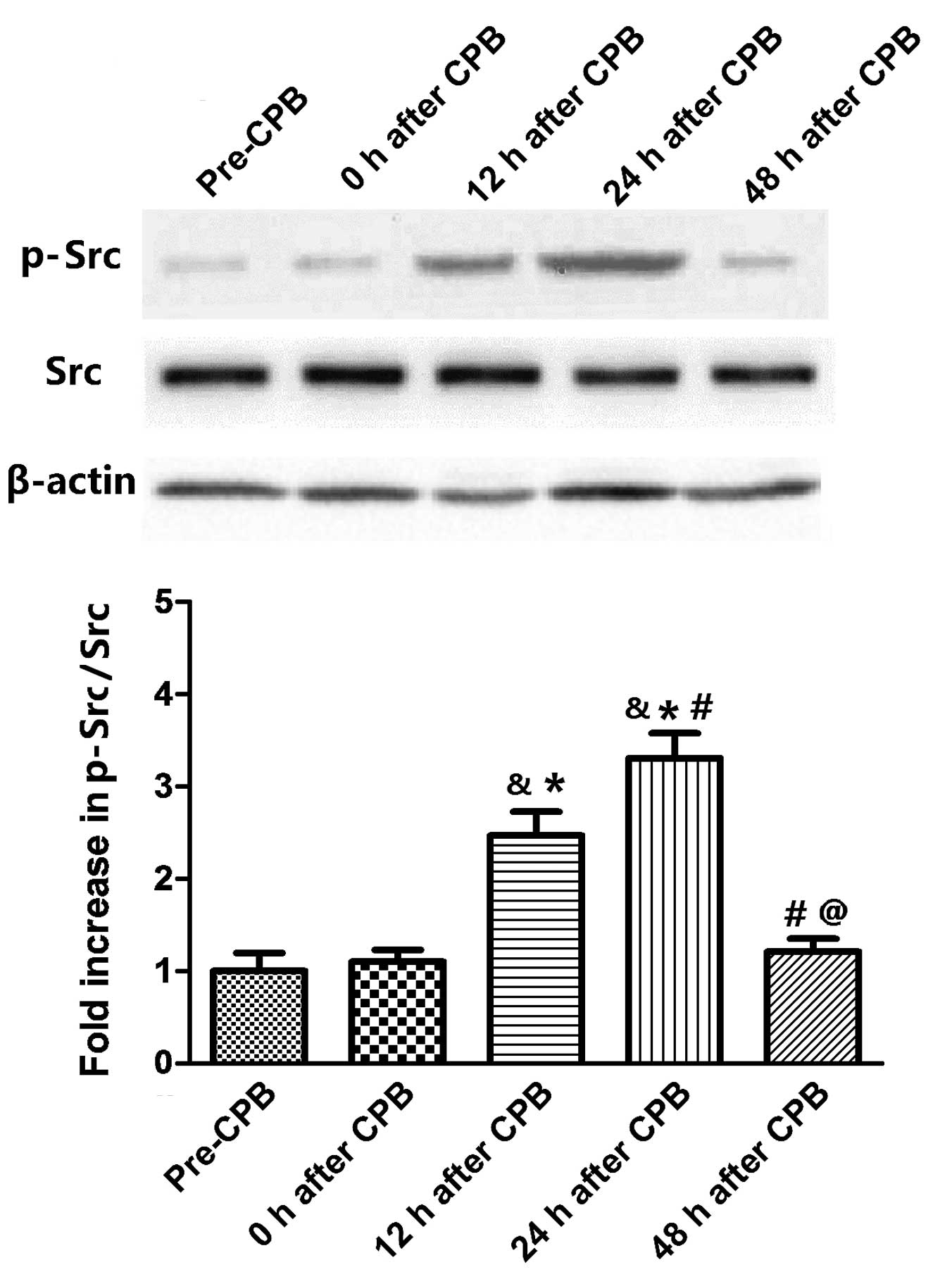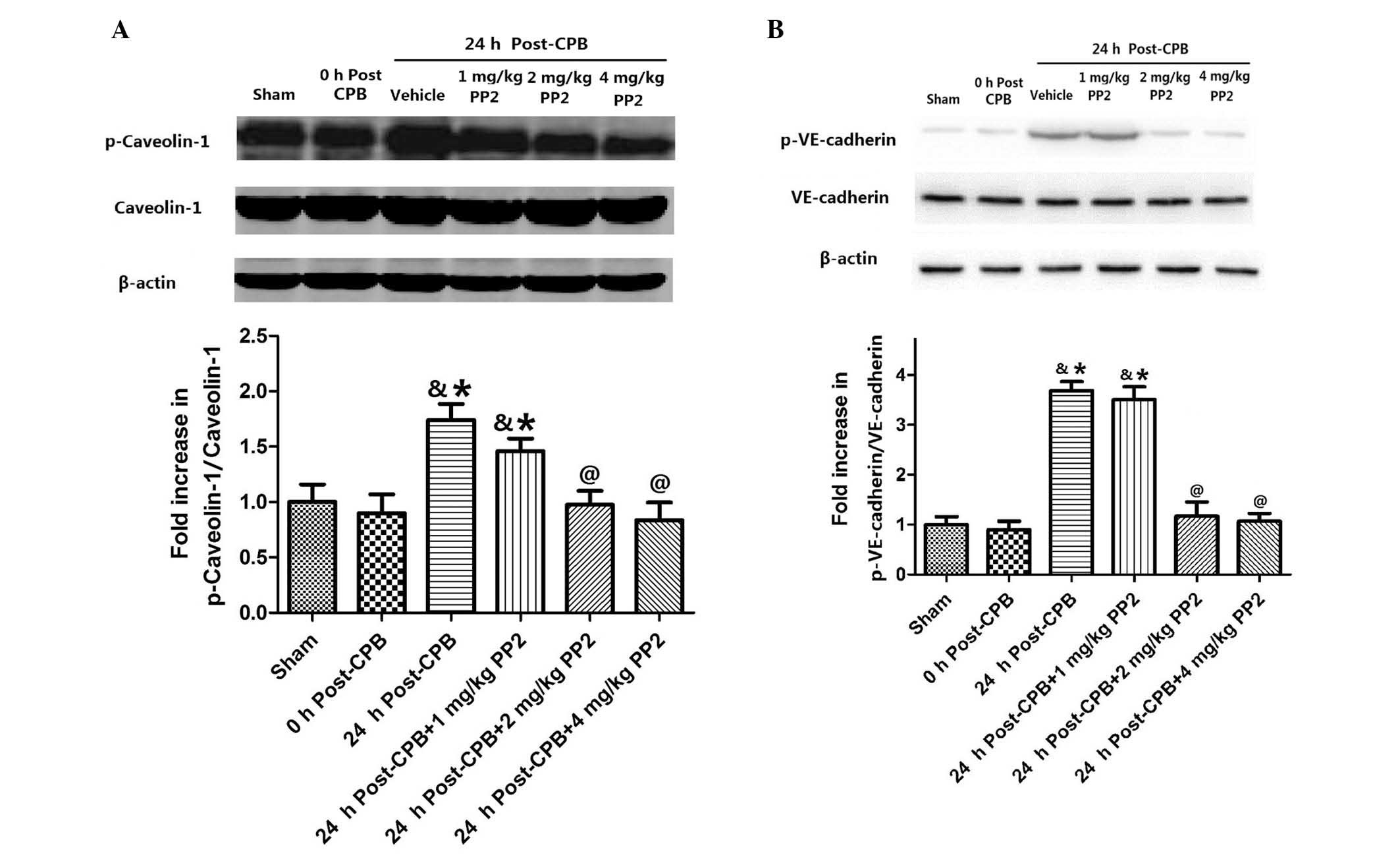|
1
|
Gibbon JH Jr: Application of a mechanical
heart and lung apparatus to cardiac surgery. Minn Med. 37:171–185.
1954.PubMed/NCBI
|
|
2
|
Edmunds LH Jr: Advances in the heart-lung
machine after John and Mary Gibbon. Ann Thorac Surg.
76:S2220–S2223. 2003. View Article : Google Scholar : PubMed/NCBI
|
|
3
|
Wahba A: Centrifugal blood pump use in
routine cardiac surgery. Interact Cardiovasc Thorac Surg.
5:299–300. 2006. View Article : Google Scholar
|
|
4
|
Cox CS Jr, Allen SJ and Brennan MS:
Analysis of intestinal microvascular permeability associated with
cardiopulmonary bypass. J Surg Res. 83:19–26. 1999. View Article : Google Scholar : PubMed/NCBI
|
|
5
|
Ng CS, Wan S, Yim AP and Arifi AA:
Pulmonary dysfunction after cardiac surgery. Chest. 121:1269–1277.
2002. View Article : Google Scholar : PubMed/NCBI
|
|
6
|
Serraf A, Aznag H, Baudet B, Détruit H,
Séccatore F, Mazmanian MG and Planché C: Pulmonary vascular
endothelial growth factor and nitric oxide interaction during total
cardiopulmonary bypass in neonatal pigs. J Thorac Cardiovasc Surg.
125:1050–1057. 2003. View Article : Google Scholar : PubMed/NCBI
|
|
7
|
Okutani D, Lodyga M, Han B and Liu M: Src
protein tyrosine kinase family and acute inflammatory responses. Am
J Physiol Lung Cell Mol Physiol. 291:L129–L141. 2006. View Article : Google Scholar : PubMed/NCBI
|
|
8
|
Oyaizu T, Fung SY, Shiozaki A, Guan Z,
Zhang Q, dos Santos CC, Han B, Mura M, Keshavjee S and Liu M: Src
tyrosine kinase inhibition prevents pulmonary
ischemia-reperfusion-induced acute lung injury. Intensive Care Med.
38:894–905. 2012. View Article : Google Scholar : PubMed/NCBI
|
|
9
|
Miyahara T, Hamanaka K, Weber DS, Drake
DA, Anghelescu M and Parker JC: Phosphoinositide 3-kinase, Src and
Akt modulate acute ventilation-induced vascular permeability
increases in mouse lungs. Am J Physiol Lung Cell Mol Physiol.
293:L11–L21. 2007. View Article : Google Scholar : PubMed/NCBI
|
|
10
|
Liu YY, Li LF, Fu JY, Kao KC, Huang CC,
Chien Y, Liao YW, Chiou SH and Chang YL: Induced pluripotent stem
cell therapy ameliorates hyperoxia-augmented ventilator-induced
lung injury through suppressing the Src pathway. PLoS One.
9:e1099532014. View Article : Google Scholar : PubMed/NCBI
|
|
11
|
Anderson RG: The caveolae membrane system.
Annu Rev Biochem. 67:199–225. 1998. View Article : Google Scholar : PubMed/NCBI
|
|
12
|
Cohen A, Hnasko R, Schubert W and Lisanti
MP: Role of caveolae and caveolins in health and disease. Physiol
Rev. 84:1341–1379. 2004. View Article : Google Scholar : PubMed/NCBI
|
|
13
|
Minshall RD, Tiruppathi C, Vogel SM and
Malik AB: Vesicle formation and trafficking in endothelial cells
and regulation of endothelial barrier function. Histochem Cell
Biol. 117:105–112. 2002. View Article : Google Scholar : PubMed/NCBI
|
|
14
|
Dejana E, Orsenigo F and Lampugnani MG:
The role of adherens junctions and VE-cadherin in the control of
vascular permeability. J Cell Sci. 121:2115–2122. 2008. View Article : Google Scholar : PubMed/NCBI
|
|
15
|
Orsenigo F, Giampietro C, Ferrari A,
Corada M, Galaup A, Sigismund S, Ristagno G, Maddaluno L, Koh GY,
Franco D, et al: Phosphorylation of VE-cadherin is modulated by
haemodynamic forces and contributes to the regulation of vascular
permeability in vivo. Nat Commun. 3:12082012. View Article : Google Scholar : PubMed/NCBI
|
|
16
|
Institute of Laboratory Animal Resources
(US): Committee on Care, Use of Laboratory Animals, and National
Institutes of Health (US). Division of Research Resources: Guide
for the care and use of laboratory animals. 7th edition. National
Academies Press; Washington, DC: 1996
|
|
17
|
Zhu J, Yin R, Shao H, Dong G, Luo L and
Jing H: N-acetylcysteine to ameliorate acute renal injury in a rat
cardiopulmonary bypass model. J Thorac Cardiovasc Surg.
133:696–703. 2007. View Article : Google Scholar : PubMed/NCBI
|
|
18
|
Cavriani G, Oliveira-Filho RM, Trezena AG,
da Silva ZL, Domingos HV, de Arruda MJ, Jancar S and Tavares de
Lima W: Lung microvascular permeability and neutrophil recruitment
are differently regulated by nitric oxide in a rat model of
intestinal ischemia-reperfusion. Eur J Pharmacol. 494:241–249.
2004. View Article : Google Scholar : PubMed/NCBI
|
|
19
|
Altmay E, Karaca P, Yurtseven N, Ozkul V,
Aksoy T, Ozler A and Canik S: Continuous positive airway pressure
does not improve lung function after cardiac surgery. Can J
Anaesth. 53:919–925. 2006. View Article : Google Scholar : PubMed/NCBI
|
|
20
|
Apostolakis E, Filos KS, Koletsis E and
Dougenis D: Lung dysfunction following cardiopulmonary bypass. J
Card Surg. 25:47–55. 2010. View Article : Google Scholar
|
|
21
|
Engels M, Bilgic E, Pinto A, Vasquez E,
Wollschläger L, Steinbrenner H, Kellermann K, Akhyari P,
Lichtenberg A and Boeken U: A cardiopulmonary bypass with deep
hypothermic circulatory arrest rat model for the investigation of
the systemic inflammation response and induced organ damage. J
Inflamm (Lond). 11:262014. View Article : Google Scholar
|
|
22
|
Macnaughton PD, Braude S, Hunter DN,
Denison DM and Evans TW: Changes in lung function and pulmonary
microvascular permeability after cardiopulmonary bypass. Crit Care
Med. 20:1289–1294. 1992. View Article : Google Scholar : PubMed/NCBI
|
|
23
|
Messent M, Sinclair DG, Quinlan GJ, Mumby
SE, Gutteridge JM and Evans TW: Pulmonary vascular permeability
after cardiopulmonary bypass and its relationship to oxidative
stress. Crit Care Med. 25:425–429. 1997. View Article : Google Scholar : PubMed/NCBI
|
|
24
|
Thomas SM and Brugge JS: Cellular
functions regulated by Src family kinases. Annu Rev Cell Dev Biol.
13:513–609. 1997. View Article : Google Scholar : PubMed/NCBI
|
|
25
|
Kevil CG, Okayama N and Alexander JS:
H(2)O(2)-mediated permeability II: Importance of tyrosine
phosphatase and kinase activity. Am J Physiol Cell Physiol.
281:C1940–C1947. 2001.PubMed/NCBI
|
|
26
|
Nwariaku FE, Liu Z, Zhu X, Turnage RH,
Sarosi GA and Terada LS: Tyrosine phosphorylation of vascular
endothelial cadherin and the regulation of microvascular
permeability. Surgery. 132:180–185. 2002. View Article : Google Scholar : PubMed/NCBI
|
|
27
|
Eliceiri BP, Paul R, Schwartzberg PL, Hood
JD, Leng J and Cheresh DA: Selective requirement for Src kinases
during VEGF-induced angiogenesis and vascular permeability. Mol
Cell. 4:915–924. 1999. View Article : Google Scholar
|
|
28
|
Paul R, Zhang ZG, Eliceiri BP, Jiang Q,
Boccia AD, Zhang RL, Chopp M and Cheresh DA: Src deficiency or
blockade of Src activity in mice provides cerebral protection
following stroke. Nat Med. 7:222–227. 2001. View Article : Google Scholar : PubMed/NCBI
|
|
29
|
Tinsley JH, Ustinova EE, Xu W and Yuan SY:
Src-dependent, neutrophil-mediated vascular hyperpermeability and
beta-catenin modification. Am J Physiol Cell Physiol.
283:1745–1751. 2002. View Article : Google Scholar
|
|
30
|
Yuan SY: Protein kinase signaling in the
modulation of microvascular permeability. Vascul Pharmacol.
39:213–223. 2002. View Article : Google Scholar
|
|
31
|
Eliceiri BP, Puente XS, Hood JD, Stupack
DG, Schlaepfer DD, Huang XZ, Sheppard D and Cheresh DA:
Src-mediated coupling of focal adhesion kinase to integrin
alpha(v)beta5 in vascular endothelial growth factor signaling. J
Cell Biol. 157:149–160. 2002. View Article : Google Scholar : PubMed/NCBI
|
|
32
|
Shi S, Garcia JG, Roy S, Parinandi NL and
Natarajan V: Involvement of c-Src in diperoxovanadate-induced
endothelial cell barrier dysfunction. Am J Physiol Lung Cell Mol
Physiol. 279:L441–L451. 2000.PubMed/NCBI
|
|
33
|
Drab M, Verkade P, Elger M, Kasper M, Lohn
M, Lauterbach B, Menne J, Lindschau C, Mende F, Luft FC, et al:
Loss of caveolae, vascular dysfunction and pulmonary defects in
caveolin-1 gene-disrupted mice. Science. 293:2449–2452. 2001.
View Article : Google Scholar : PubMed/NCBI
|
|
34
|
Minshall RD, Sessa WC, Stan RV, Anderson
RG and Malik AB: Caveolin regulation of endothelial function. Am J
Physiol Lung Cell Mol Physiol. 285:L1179–L1183. 2003. View Article : Google Scholar : PubMed/NCBI
|
|
35
|
Gonzalez E, Nagiel A, Lin AJ, Golan DE and
Michel T: Small interfering RNA-mediated down-regulation of
caveolin-1 differentially modulates signaling pathways in
endothelial cells. J Biol Chem. 279:40659–40669. 2004. View Article : Google Scholar : PubMed/NCBI
|
|
36
|
Sun Y, Hu G, Zhang X and Minshall RD:
Phosphorylation of caveolin-1 regulates oxidant-induced pulmonary
vascular permeability via paracellular and transcellular pathways.
Circ Res. 105:676–685. 2009. View Article : Google Scholar : PubMed/NCBI
|
|
37
|
Shajahan AN, Timblin BK, Sandoval R,
Tiruppathi C, Malik AB and Minshall RD: Role of Src-induced
dynamin-2 phosphorylation in caveolae-mediated endocytosis in
endothelial cells. J Biol Chem. 279:20392–20400. 2004. View Article : Google Scholar : PubMed/NCBI
|
|
38
|
Minshall RD, Tiruppathi C, Vogel SM, Niles
WD, Gilchrist A, Hamm HE and Malik AB: Endothelial cell-surface
gp60 activates vesicle formation and trafficking via Gi-coupled Src
kinase signaling pathway. J Cell Biol. 150:1057–1070. 2000.
View Article : Google Scholar : PubMed/NCBI
|
|
39
|
Hu G, Vogel SM, Schwartz DE, Malik AB and
Minshall RD: Intercellular adhesion molecule-1-dependent neutrophil
adhesion to endothelial cells induces caveolae-mediated pulmonary
vascular hyperpermeability. Circ Res. 102:e120–e131. 2008.
View Article : Google Scholar : PubMed/NCBI
|
|
40
|
Lim MJ, Chiang ET, Hechtman HB and Shepro
D: Inflammation-induced subcellular redistribution of VE-cadherin,
actin and gamma-catenin in cultured human lung microvessel
endothelial cells. Microvasc Res. 62:366–382. 2001. View Article : Google Scholar : PubMed/NCBI
|
|
41
|
Gavard J, Hou X, Qu Y, Masedunskas A,
Martin D, Weigert R, Li X and Gutkind JS: A role for a
CXCR2/phosphatidylinositol 3-kinase gamma signaling axis in acute
and chronic vascular permeability. Mol Cell Biol. 29:2469–2480.
2009. View Article : Google Scholar : PubMed/NCBI
|
|
42
|
Gavard J and Gutkind JS: VEGF controls
endothelial-cell permeability by promoting the
beta-arrestin-dependent endocytosis of VE-cadherin. Nat Cell Biol.
8:1223–1234. 2006. View
Article : Google Scholar : PubMed/NCBI
|
|
43
|
Mehta D and Malik AB: Signaling mechanisms
regulating endothelial permeability. Physiol Rev. 86:279–367. 2006.
View Article : Google Scholar
|
|
44
|
Aberle H, Schwartz HR and Kemler R:
Cadherin-catenin complex: Protein interactions and their
implications for cadherin function. J Cell Biochem. 61:514–523.
1996. View Article : Google Scholar : PubMed/NCBI
|
|
45
|
Song L, Ge S and Pachter JS: Caveolin-1
regulates expression of junction-associated proteins in brain
microvascular endothelial cells. Blood. 109:1515–1523. 2007.
View Article : Google Scholar
|


















